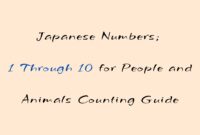Starting Japanese Language Learning: Everyday Vocabulary You Need to Know
Learning Japanese is a process that trains language skills while fostering
cross-cultural understanding. It opens many opportunities for study, work, or
other activities in Japanese-speaking environments. With the advancement of
technology, you can learn Japanese online for free and start exploring this
rich language.
Here is a list of the most common and useful everyday Japanese vocabulary:
1. Greetings and Salutations
おはようございます (Ohayou gozaimasu) – Good morning
こんにちは (Konnichiwa) – Hello / Good afternoon
こんばんは (Konbanwa) – Good evening
おやすみなさい (Oyasuminasai) – Good night
ありがとう (Arigatou) – Thank you
ありがとうございます (Arigatou gozaimasu) – Thank you very much
すみません (Sumimasen) – Excuse me / Sorry
さようなら (Sayounara) – Goodbye
2. Common Questions
これは何ですか? (Kore wa nan desu ka?) – What is this?
いくらですか? (Ikura desu ka?) – How much is it?
どこですか? (Doko desu ka?) – Where is it?
お元気ですか? (Ogenki desu ka?) – How are you?
3. Basic Expressions
はい (Hai) – Yes
いいえ (Iie) – No
いいですね (Ii desu ne) – That’s great / Okay
大丈夫です (Daijoubu desu) – It’s okay / All right
わかります (Wakarimasu) – I understand
わかりません (Wakarimasen) – I do not understand
お願いします (Onegaishimasu) – Please / I would appreciate it
ごめんなさい (Gomen nasai) – Sorry
4. Everyday Nouns
家 (Ie) – House
学校 (Gakkou) – School
仕事 (Shigoto) – Work
友達 (Tomodachi) – Friend
店 (Mise) – Store
車 (Kuruma) – Car
電車 (Densha) – Train
お金 (Okane) – Money
5. Common Adjectives
小さい (Chiisai) – Small
新しい (Atarashii) – New
大きい (Ookii) – Big
古い (Furui) – Old
安い (Yasui) – Cheap
高い (Takai) – Expensive / High
暑い (Atsui) – Hot (weather)
寒い (Samui) – Cold (weather)
6. Numbers 1–10
いち (Ichi) – One
に (Ni) – Two
さん (San) – Three
よん / し (Yon / Shi) – Four
ご (Go) – Five
ろく (Roku) – Six
なな / しち (Nana / Shichi) – Seven
はち (Hachi) – Eight
きゅう / く (Kyuu / Ku) – Nine
じゅう (Juu) – Ten
7. Everyday Verbs
行く (Iku) – Go
来る (Kuru) – Come
見る (Miru) – See
話す (Hanasu) – Speak
聞く (Kiku) – Listen / Ask
食べる (Taberu) – Eat
飲む (Nomu) – Drink
買う (Kau) – Buy
8. Personal Pronouns
私 (Watashi) – I
あなた (Anata) – You
彼 (Kare) – He
彼女 (Kanojo) – She
私たち (Watashitachi) – We / Us
9. Everyday Time Phrases
今 (Ima) – Now
朝 (Asa) – Morning
昼 (Hiru) – Afternoon
夜 (Yoru) – Night
今日 (Kyou) – Today
昨日 (Kinou) – Yesterday
明日 (Ashita) – Tomorrow
The vocabulary above is useful for everyday conversations and provides a solid
foundation for further mastering Japanese. Mastering this vocabulary will
assist you in various situations, whether interacting with native speakers or
accessing Japanese-language content online.
Consider utilizing available resources to improve your understanding and
language skills. You can easily learn Japanese online for free through various
platforms that offer a wealth of materials, such as videos, quizzes, and
speaking exercises, designed to help learners of all proficiency levels.
With dedication to learning and consistent practice, you’ll find that studying
Japanese is not only engaging but also opens up numerous opportunities to
appreciate its rich and unique culture. Start your journey today, and enjoy
the process!


